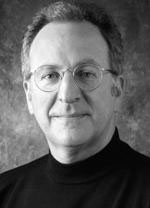Jazz and haiku: Skorton sees arts and humanities as university's 'soul'
By Linda Grace-Kobas

At the age of 9 he picked up an alto saxophone and dreamed of being a musician. During college he played tenor sax in a Chicago blues band. He now co-hosts a jazz program on public radio and last October contributed to hurricane relief by performing in a Dixieland band at a University of Iowa (UI) benefit concert.
His love of jazz adds a soulful dimension to David J. Skorton, Cornell's newly named president, who has achieved national recognition as a supporter of the humanities and arts.
One of his first initiatives as UI president was to declare a "Year of the Arts and Humanities" in 2004. It was a yearlong celebration that featured a kick-off festival, dozens of events and performances, and grants to support faculty projects throughout Iowa.
"As an academic, social and cultural force, the arts and humanities comprise the soul of the university," Skorton said in announcing the celebration. He said the effort would "raise the profile of these fields and celebrate the immense reach and profound importance of academic arts and humanities."
Skorton told The Chronicle of Higher Education (June 10, 2005) that he had decided to unify the UI campus by selecting a specific topic to address during each year of his presidency. He chose his first-year focus because "many people will advocate for the sciences, but support for the arts and humanities has been slim."
He also is a member of a national steering committee formed by the Association of American Universities (AAU) and the American Council of Learned Societies (ACLS) that is charged with initiating and developing strategies to examine the role and status of the humanities. Cornell Provost Biddy Martin also is a member of the steering committee.
"He has been a creative and articulate spokesperson and advocate for the arts and humanities," Martin said. She added that they both were involved in recruiting Ohio Congressman Jim Leach, a prominent supporter of funding for the National Endowment for the Humanities, to speak at the AAU/ACLS Humanities Convocation to be held May 12 in Philadelphia. "I have enjoyed working with him [Skorton] in that context and look forward to working with him here," she said.
In his UI presidential installation speech on March 1, 2003, Skorton recited this haiku by celebrated author Richard Wright:
From a tenement,
The blue jazz of a trumpet
Weaving autumn mists.
There were a dozen more haiku interspersed within his speech: others by Wright and verses by modern Japanese poets Arima Akito and Suzuki Masajo, 18th century haiku master Ichiku, Canadian poet George Swede and Americans Nicholas Vergilio and Lee Gurga. He spoke of challenges and the important questions of our time and asked: "But what of the arts, humanities and social sciences? Are there any disciplines or pursuits more central to our core educational mission, to our deepest lives, than these? I think not."
His focus on the deeper, humanistic questions of existence may be the product of Skorton's personal history. The Chronicle of Higher Education reported that Skorton's parents fled what is now Belarus after the 1917 Bolshevik revolution. His father, Sam, who never finished high school, wanted his son to have a college education. Skorton worked in his father's shoe store as a teenager and dreamed of a career as a musician. But his parents urged him to have a profession.
Skorton began his academic career studying comparative religion and philosophy at the University of California-Los Angeles but then transferred to Northwestern University to major in psychology. While completing his B.A. degree there, he "played tenor saxophone in an otherwise all-black blues band that worked small Chicago clubs," the Chronicle reported.
"Eventually music would take a back seat to his growing interest in medicine, which combined his fascination with the sciences and philosophy," the Chronicle story continued, noting that he earned his medical degree at Northwestern and did a residency at UCLA.
These days, despite the demands of the presidency and his continued clinical practice, Skorton finds time to co-host "As Night Falls," a Sunday-night jazz show on UI's public radio station KSUI-FM, from 7 to 9 p.m. According to the KSUI Web site, the show "features an eclectic mix of jazz from the classics of Billie Holiday and Louis Armstrong to sultry Latin sounds and World music to some of the most intriguing techniques offered via contemporary jazz."
"An eclectic mix." The words seem to describe Skorton himself.
Media Contact
Get Cornell news delivered right to your inbox.
Subscribe